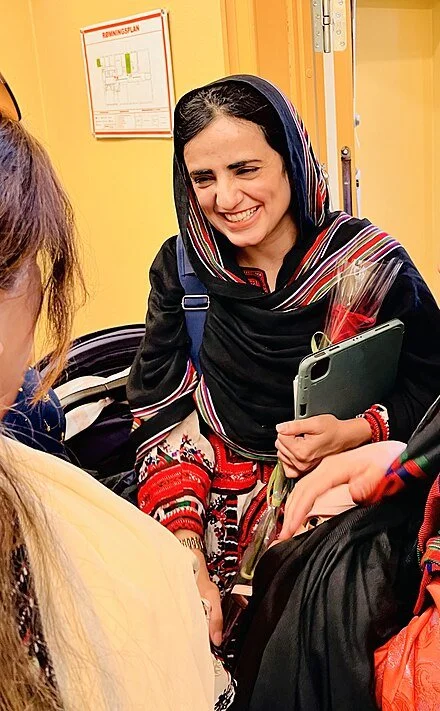
Nine days, nine women who are changing the world
Navaratri 2025
What is Navaratri?
Navaratri is the Hindu festival celebrating the goddess Durga, the goddess of strength and protection. We dedicate these nine nights to Mother Durga and her nine forms: Shailaputri, Brahmacharini, Chandraghanta, Kushmanda, Skandamata, Katyayani, Kalaratri, Mahagauri, and Siddhidatri.
Each form of Durga represents the strength and power of the divine feminine, reflected in the strength and power of the women of the world. We honor Durga and pray for the victory of good over evil in our world.
As Hindus for Human Rights, we channel Durga in our work for equality, justice, liberation, and human rights. This Navaratri we wish to highlight the courage of women all over the world; from human rights defenders to athletes to journalists. We stand in solidarity with the women of South Asia and beyond, from India to Uganda to the USA. These nine women we have chosen to celebrate and honor this Navaratri represent our vision of the divine feminine: brave, resilient, strong, outspoken, and true to themselves.
While the women we choose to honor are incredible examples of female prowess, we believe that the beauty and strength of womanhood can be found in everyday actions.
Who is a woman that inspires the divine feminine in your life this Navaratri?
Who are we celebrating this Navaratri?
-
Gulfisha Fatima is a Muslim student activist who was jailed for protesting India’s discriminatory Citizenship Amendment Act. She has been in Tihar Jail since April 2020, and despite receiving bail, she is still imprisoned without trial because it is an alleged conspiracy case.
However, even from behind bars, Gulfisha’s commitment to activism is relentless. She continues to fight for civil rights, dignity, and the rights. of minority communities, and is a staunch advocate for religious equality in an India that grows further divided.
“Even in prison, her voice cannot be silenced.”
-
Mahrang Baloch is a human rights defender from Balochistan, a region divided amongst modern day Pakistan, Afghanistan, and Iran. She is the leader of the Baloch Yakjehti Committee (BYC), a human rights movement created in response to the unlawful forced disappearances and extrajudicial killings of the Baloch people by the Pakistani authorities.
Balochistan is the poorest province in Pakistan, and has a long history of exploitation and violence at the hands of the Pakistani government; Mahrang Baloch and the BYC represent resistance to this violence and the resilience of the Baloch people.
In December 2023, Mahrang was one of the key organizers in the Baloch Long March, a roughly thousand mile long journey in which hundreds of women traveled from Turbat, in the southwest of Balochistan, to Islamabad, the capital of Pakistan, to protest the extrajudicial killing of young Baloch men. Protestors of the Baloch Long March experienced unlawful detainment, harassment, police violence, tear gas and baton use, and more. More than 300 protestors were indiscriminately arrested.
Today, Mahrang sits behind bars, yet continues to be a beacon of hope in the fight for Baloch self-determination, rights, and safety, and we applaud her tireless efforts and commitment to political freedom for the Baloch people.
"When the state disappears your loved ones, silence is not an option."
-
For Day Three, we turn our eyes to the incredible work of our very own Advisory Board Member, Teesta Setalvad.
Setalvad is a senior journalist, academic and educationist who has worked with several Indian publications since 1983.
She's particularly respected for her pioneering analysis and coverage of social violence against marginalized groups and has even received the Padma Shri award from the President of India for Service in Public Affairs in Maharashtra.
Setalvad's commitment to sharing the truth, no matter the consequences, is a righteous act of fearlessness in an India that increasingly cracks down on freedom of speech.
"Justice is her dharma."
-
Suneeta Potham is a grassroots leader in Chhattisgarh who organizes for the rights of Dalit and Adivasi people.
Combining feminism with the fight for indigenous rights, Potham organizes Dalit and Adivasi women to resist systemic oppression and claim their rights, especially in the face of government-sanctioned violence across the state.
"Her fight against caste and gender violence begins in the village -- and echoes across India."
-
Remembering Gauri Lankesh, 1962 - 2017
On day five of Navratri, we remember the fearless Gauri Lankesh. An activist and journalist hailing from Bangalore, Lankesh was committed to exposing the horrifying realities that right-wing Hindu nationalism perpetuates.
In addition to resisting extremism, she was an avid feminist and outspoken in her opposition of caste-based discrimination.
On September 5th, 2017, Lankesh was murdered outside of her home by three men who claimed that by killing her, they were 'saving their religion'. This disgusting act of violence is yet another grim example of the dangers journalists must face simply for telling the truth.
We honor Lankesh for her commitment to reporting the truth, as well as her desire for a better, more just, equal world.
"They silenced her voice, but her words still roar."
-
Medha Patkar is a founding member of Narmada Bachao Andolan, or the 'Save the Narmada River Movement’. Led by Adivasis, farmers, environmentalists, and human rights activists, this movement uses court actions, hunger strikes, civil disobedience, and rallies in order to spread awareness on the importance of environmental protection and sustainability.
Medha has organized several fasts and satyagrahas for the cause, resulting in her being jailed multiple times.
Her commitment to her community goes just beyond saving the Earth; Medha has been a steadfast advocate for the rights of Adivasis, Dalits, farmers, laborers, and women.
In 2000, TIME Magazine included her on their list of 100 heroes of the 20th century. Today, at the age of 70, she continues to advocate for those who are facing human rights struggles, her spirit unwavering in the chase for justice.
"The river flows, and so does her struggle."
-
Sandya Ekneligoda is Sri Lankan activist committed to campaigning for the thousands of missing persons across Sri Lanka.
Her activism is born from personal tragedy: her husband, Prageeth Eknaligoda, had informed her that he was on a hit list and that he was receiving threats to stop writing. In 2010, he disappeared while investigating the use of chemical weapons against civilians.
For the past 15 years, Sandya has fought tirelessly for both an investigation into the disappearance of her husband as well as the thousands of other civilians disappeared in Sri Lanka. Sri Lanka has one of the highest enforced disappearance rates in the world; estimates suggest that between 60,000 to 100,000 people have disappeared since the 1980s.
Sandya fights back against this authoritarian tactic used to suppress dissent and silence critics. Her bravery is recognized worldwide; in 2017, she received the International Women of Courage award, and in 2022, she was recognized as one of BBC’s 100 Women.
“Turning grief into a call for justice."
-
Fawzia Koofi is an Afghan politician, writer, and women’s rights activist, who is most recently known for her role as a member of the Afghan delegation negotiating peace with the Taliban in Doha, Qatar. Prior to joining the delegation and Taliban rule, she was Member of Parliament in Kabul and Vice President of the National Assembly.
Fawzia was the only girl in her family to attend school. Her plans for university were disrupted by the Taliban’s takeover of Afghanistan; however, once their fall in 2001, she pursued a degree and went on to work with Internally Displaced People as well as become a Child Protection Officer for UNICEF.
Fawzia has always been a committed advocate to the education of women and girls; during her time in the Afghan government, she ran a “Back to School” campaign encouraging female enrollment. She drafted the Elimination of Violence Against Women legislation (which was unfortunately shot down by conservative Parliament members) and has frequently advocated for better infrastructure, roads, and resources for those residing in rural areas.
Fawzia has survived several assassination attempts, but has never let these intimidate her in her fight for gender equality. Her never-ending and fearless commitment for the rights of women and girls, especially when it comes to education, has touched the lives of thousands, helping women and girls across Afghanistan realize their worth and value, despite the current state of politics and human rights.
"Her vision for Afghan women cannot be erased by fear."
-
Irene Khan is a British-Bangladeshi human rights lawyer, who is currently serving as the UN Special Rapporteur on Freedom of Expression and Opinion.
Her career in human rights goes above and beyond — she founded the organization Concern Universal, worked at the United Nations High Commissioner of Refugees, and became the youngest UNHCR representative at the time when she was appointed as the Chief of Mission for India.
During the Kosovo Crisis, she led the UNHCR team in Macedonia. In the early 2000s, she became the Secretary General of Amnesty International.
She’s done all this and more — these accomplishments barely scrape the surface of her incredible reputation and commitment to upholding human rights worldwide.
Irene Khan is a reminder to women and girls everywhere to dream big and never back down — anything a man can do you can do just as well, if not better.
"Defending those who dare to speak."











